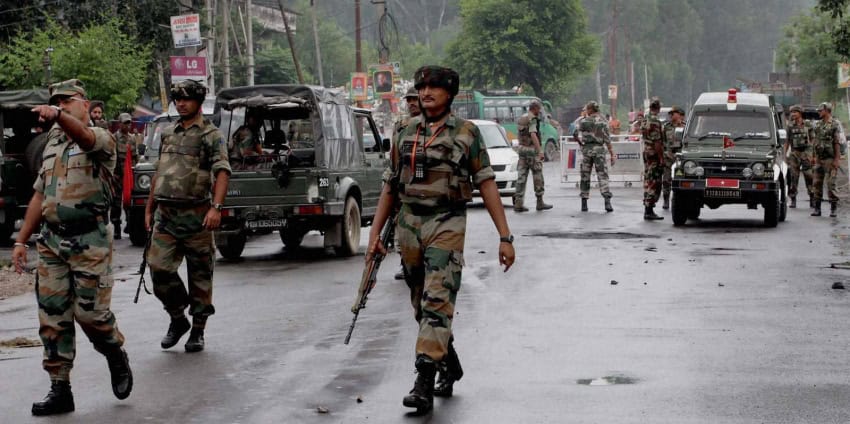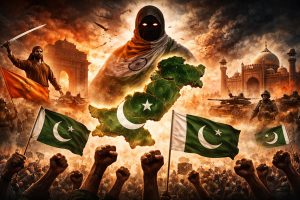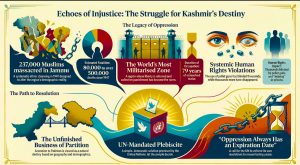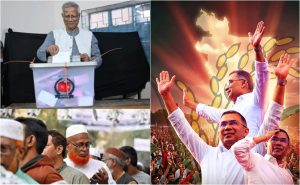Thousands of extra judicial killings, enforced disappearances, mass graves and recurrent incidents of violence brushed under the carpet away from plain sight, under the power of the “world’s largest democracy”. An organized system of institutionalized violence has been evolved by the Indian state, specifically in the occupied territory of Jammu and Kashmir. To enforce and legitimize this system of persecution and instrumental oppression, legislation such as the ‘Armed Forces Special Powers Act’ (AFSPA) is employed.
AFSPA, one of the most dreaded words in a Kashmiri’s vocabulary, is not less then a curse on the population of the occupied territory. Conventionally applied in ‘disturbed areas’ of the Indian federation, the provisions of the act empower their Army personnel to shoot and use force, even to the extent to kill anyone that they consider is acting in contravention with law and order. Further, it allows them to arrest any person on the basis of suspicion and to enter any building or stop any vehicle to search, on the basis of suspicion, all without any warrant.
A provision of this law also requires all arrested people to be handed over to the nearest police station with a report on the circumstances of the arrest, but the more than 8000 enforced disappearances in Kashmir only from 1989 to 2009, speak volumes on the implementation of this provision.
The Special Powers Act was extended to Kashmir in 1990 but it has been enforced in the North Eastern states declared ‘disturbed areas’ for long before that. The whole of the Manipur state was declared ‘disturbed’ in 1980. Several incidents of human rights violations have been documented in these areas marked with heavy militarization, to the extent that, according to a Wikileaks cable the US Consulate General in India remarked “Manipur was less a state and more a colony of India.” The violations including extra judicial killings, custodial brutality and rapes in these territories have resulted in various demonstrations including one in 2004 where a dozen naked women protested outside the Assam Rifles headquarters with signs daring the Indian Army to rape them. The world’s longest hunger striker Irom Sharmila, the iron lady of Manipur, has refused food and drink since November 2000, in protest against the draconian Special Powers Act.
The Jeevan Reddy Commission of 2005 to review AFSPA,was formed as a result of the severe protests on the death of the custodial killing of Thangjam Manorama. The 147 paged report remarked that the act “has become a symbol of oppression, an object of hate and an instrument of discrimination and high handedness.” The commission also called for the revocation of the act.
In 2013, the Santosh Hedge Commission was formed, which took into consideration 6 sample cases of encounters. They found that none of these encounters were genuine and that “maximum force” had been employed to kill people. In the 100 paged report the commission also remarked that “Though the Act gives sweeping powers to security forces even to extend of killing a suspect with protection against prosecution, it does not provide any protection to the citizens against its possible misuse.” Further, it stated that the strictness of the accountability mechanism is supposed to increase with the increase in the powers granted, but in this case the trend seems to be reversed.
Another committee in 2013, the Justice Verma Committee recommended that the personnel guilty of sexual offenses in conflict territories should be tried under ordinary criminal law.
This recommendation echoes of the call of the activists from Kashmir that have repeatedly questioned the accountability mechanism of the armed forces, where hardly any relief is granted to the aggrieved. The committee also stated that “Systematic or isolated sexual violence, in the process of Internal Security duties, is being legitimized by the Armed Forces Special Powers Act, which is in force in large parts of our country.”
In a report by Amnesty International 1st of July 2015, which also contained interviews of 58 family members of victims of alleged human rights violations by security forces, it was recommended that India should withdraw the AFSPA from Kashmir and invite the UN Special Rapporteur and the UN Working Group on disappearances to visit the territory with “unimpeded access” to the victims and witnesses. The report focused on section 7 of AFSPA, which grants special immunity to the security personnel. The report also stated that the central government has rejected to permit prosecution against members of the military and paramilitary forces, and in the very small number of cases accepted, it has kept the decision pending for years. The armed forces deny the allegations declaring 96% of the cases ‘false and baseless’. But evidence for finding majority of these allegations false is not publicly available.
The law is not only in contravention with basic human rights, but also against the essence of the Indian constitution which clearly provides for ‘Equality before law’ through it’s article 14, “Protection of life and liberty” through article 21 and “Protection against arrest and detention” through article 22. Further, this act has to be reviewed every 6 months, which according to a Supreme Court ruling in 2008, had not been done in the case Jammu and Kashmir either.
From international human rights groups to activists inside India, voices are consistently being raised for the removal of this tyrannical piece of legislation and for the accountability of the armed forces. The debate is sparked every now and then with fresh incidents of human rights violations, but it is the unavoidable and humane responsibility of the international community to pressurize the Indian government to strike down this act, before more incidents of rapes, disappearances and killings with ‘legal protection’ surface.














